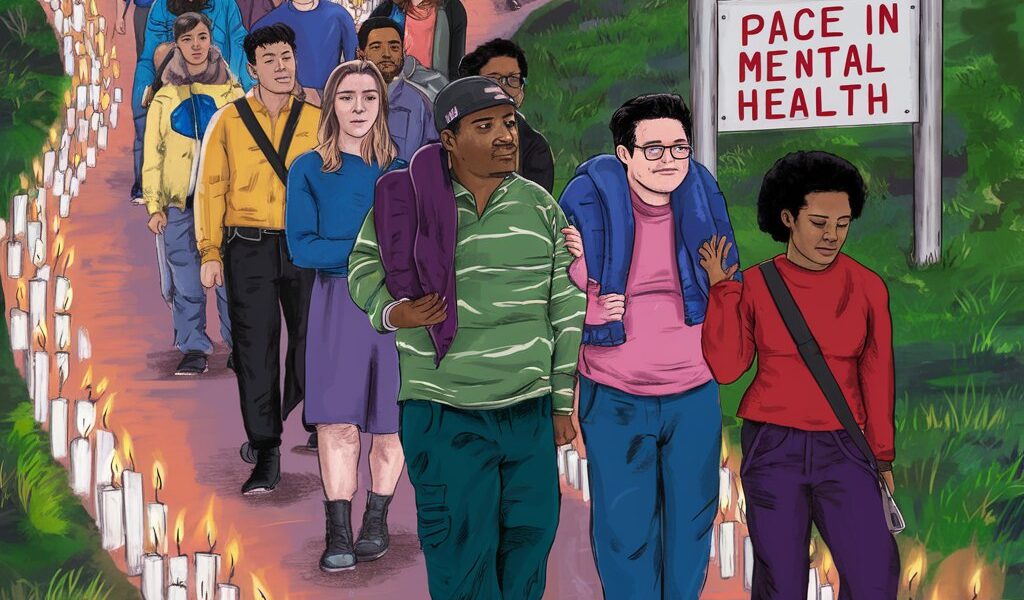When most people hear the term ”pace in mental health,” they think of “Mental Illness.” However, mental health involves much more than the absence of mental illness.
Mentally healthy people understand that no one is perfect, that everyone has limits, and that you can’t be everything to everyone. They experience a range of emotions every day, including joy, love, satisfaction, sadness, anger, and frustration. They are able to face the challenges and changes of daily life with balance and know how to seek help when they have difficulty dealing with conflicts, disturbances, traumas, or important transitions in different life cycles.
A person’s Mental Health is related to how they react to the demands of life and how they harmonize their desires, capabilities, ambitions, ideas and emotions.
Having mental health is:
- Being well with yourself and with others
- Accepting the demands of life
- Knowing how to deal with good emotions and also with unpleasant ones, which are part of life
- Recognize your limits and seek help when needed

What is meant by PACE? Playfulness, acceptance, curiosity and empathy.
PACE is a way of thinking, feeling, communicating and behaving that aims to make the child feel safePACE is a way of thinking, feeling, communicating and behaving that aims to make the child feel safe. It is based upon how parents connect with their very young infants. As with young toddlers, with safety the child can begin to explore.
With PACE, the troubled child can start to look at himself and let others start to see him, or get closer emotionally. He can start to trust.
Most common mental health problems
- Anxiety
- Psychological discomfort or continued stress
- Depression
- Alcohol and other drug addiction
- Psychotic disorders such as schizophrenia
- Mental retardation
- Dementia
It is estimated that 30 out of every 100 people suffer or will suffer at one time or another in their lives from mental health problems and that around 12 have a serious mental illness.
Depression is the most common mental illness and is a major cause of disability.
Approximately 1 out of every 100 people suffers from schizophrenia.Who can be affected?
Throughout our lives, we can all be affected by mental health problems, of varying severity.
Certain stages, such as starting school, adolescence, menopause and ageing, or events and difficulties, such as the loss of a close family member, divorce, unemployment, retirement and poverty, can cause mental health problems.
Genetic, infectious or traumatic factors can also be the cause of serious mental illnesses.Misconceptions about mental illness
People affected by mental health problems are often misunderstood, stigmatized, excluded or marginalized due to false concepts, which need to be clarified and demystified, such as:
- Mental illnesses are a figment of the imagination;
- Mental illnesses have no cure;
- People with mental problems are unintelligent, lazy, unpredictable or dangerous.
These myths, along with the stigma and discrimination associated with mental illness, cause many people to have to
seek treatment, as recovery is more effective the earlier treatment is given.
Even in the most serious illnesses, it is possible to control and reduce symptoms and, through rehabilitation measures,There is no scientific consensus around the concept of mental health.
In the absence of a specific definition, let’s look at the idea of the definition of health in general outlined by the World Health Organization (WHO):
“Health is a state of complete physical, mental and social well-being, and not merely the absence of disease.”
Note that, according to the world’s leading health authority, mental health is an integral part of the process .
We are not completely healthy if our mind is not in balance.
This leads us to the conclusion that this is an aspect of health that, if neglected, can lead to harmful consequences in the short, medium and long term.
How important is mental health?
Have you ever heard of psychosomatic illnesses ?
This is the term used to define illnesses that arise from disorders such as anxiety and depression, to name just the best known.
A survey published by reveals that in the United States around 6% of the population suffers from some type of psychosomatic illness.
This is a fact that reinforces the importance of being mentally balanced, considering the risks of developing diseases.
Not to mention the social, career and relationship damage caused by disorders that prevent people from interacting normally and having a productive life. Who can have their mental health affected?
Research by the Royal Australian College also reveals that women are the ones who suffer most from psychosomatic illnesses.
This trend is confirmed by the OWD, according to which 11.9% of the female population suffers from mental illness, while among men, this percentage is 9.3%.
The younger population , between 15 and 49 years old, is among those most affected by this type of disease.
OWD data points to an increase in the number of cases between 1990 and 2019, while in the population over 50 years old, the prevalence decreased.
What are the mental health problems?
One of the challenges faced by public and private health organizations is overcoming the stigma associated with mental illness.
People who suffer from disorders such as anxiety and depression, and more serious ones such as bipolar disorder or schizophrenia, fear being socially excluded or being called “crazy.”
However, sweeping a serious problem under the rug only makes the situation worse.
Perhaps this is why Brazil is now considered the country with the highest number of anxious people in the world , and one of the countries with the highest number of cases of depression .
It is necessary to overcome prejudice , something that is only possible through education and information.
To do this, it is essential to know the most common types of mental health problems, how they manifest themselves and how to treat them.
Anxiety
Anyone can occasionally feel anxious due to some kind of expectation.
In other words, anxiety itself is not a disease.
It starts to become a disorder when it lasts for a long time or when it appears without any reason.
Anxious people are in a state of permanent tension, believing that something bad could happen at any moment.
They suffer from low self-esteem , which has negative repercussions on their social, emotional and work lives .
Treatment for anxiety generally involves psychotherapy and social and alternative rehabilitation methods, such as mindfulness practice .
In more severe cases, controlled anxiolytics may be prescribed .
Panic Syndrome
When it gets worse, anxiety can lead to panic attacks , in which fears (many of them irrational) arise suddenly and very intensely, strongly affecting the body.
Successive attacks characterize Panic Syndrome , a state in which the person begins to worry in an unhealthy way about the future and what is around them.
Panic attacks are usually associated with other behavioral disorders and are more common in people who are anxious or depressed.
They also manifest with a series of physical reactions, such as sweating, tachycardia, dizziness and localized pain.
In addition to psychotherapy, benzodiazepines may be prescribed, in many cases for long periods of time.
Depression
The federal government estimates that the prevalence of depression throughout Brazilians’ lives is 15.5% .
Although it is often associated with anxiety it is a distinct problem the main characteristic of which is a lack of willingness to even carry out simple tasks.
Thus, depression is a potential cause of incapacity for work as it prevents its sufferer from leading a normal life.
It leads to a lack of energy appetite and libido with direct consequences on quality of life.
Like anxiety, it can also be treated with psychotherapy or, in more acute cases, antidepressants may be prescribed.
Post-Traumatic Stress Disorder
While anxiety and depression in many cases have no apparent primary cause in Post-Traumatic Stress Disorder (PTSD) the origin is clearer.
In this type of anxiety disorder the anxious state arises due to a specific event with a strong emotional impact .
This is the case of people who cannot overcome the loss of family members those who have suffered accidents, war veterans or victims of kidnapping, among other causes.
Burnout Syndrome
Another disorder with specific causes is Burnout Syndrome , or exhaustion.
In the workplace it usually affects people who are subjected to constant stressful situations or who are subject to excessive demands on their performance (pressure sometimes inflicted by themselves).
In Brazil, this is also a problem that affects a significant portion of the population with 32% of Brazilians diagnosed with this syndrome.
How to take care of your mental health?
Behavioral disorders can be caused by factors such as genetics, medication use, or neurocerebral injuries.
In these cases, pharmacological treatment is the most appropriate to control symptoms.
However, most patients who suffer from any of these disorders can be treated with low-risk methods , such as psychotherapy and group therapy, among other approaches.
So much so that, in milder cases it is enough to simply make lifestyle changes to restore mental health.
Below are some effective ideas for combating and preventing the problems that affect mental health.
Physical activity
Medicine has already more than proven the health benefits provided by practicing sports.
On a physical level, sporting activity causes the nervous system to release hormones linked to pleasure, such as endorphins and serotonin .
It is like a natural “doping” when the body autonomously produces substances that increase well-being and, consequently, improve the health of our mind.
With regular practice, a person can return to a balanced state and have a productive routine in their activities.
I am
Likewise, doctors and scientists know that without a regular sleep routine the risk of developing mental health problems increases considerably.
As highlighted in an article from Harvard University (in English), sleep deprivation directly affects the mental and cognitive aspects , with emotional and professional performance losses.
It is therefore not surprising that anxious people suffer from symptoms such as insomnia or irregular sleep .
In any case, it is necessary to investigate the real causes of the lack of sleep with a doctor in order to find the appropriate treatment.
Food

The importance of nutrition for mental health You have probably already noticed that good health depends on a number of factors that need to be in balance.
One of the most important is diet that is what we eat and how often we eat.
An article by the Mental Health Foundation (in English) highlights the relationship between food and mental health, highlighting the benefits of eating a balanced diet for our well-being.
Meditation
A practice still not very widespread among most Brazilians meditation is one of the simplest ways to take care of your mental health .
This is because it promotes benefits in the respiratory system which when controlled leads to a more relaxed and mindful state.
Meditation is above all path to self-knowledge and self-control .
People who are in touch with their own feelings expectations and affections are naturally more secure and as a result mental disorders cease to exist.
Social life
Group therapy is one of the activities that can be recommended in the treatment of anxiety or depression.
It helps people with mental health issues reintegrate into a community through playful activities and real-life tasks.
In this way she regains her sense of belonging feeling useful and productive again.
This is also an approach used to recover relationships in crisis as happens in couples therapy.
Treatment
As we have already highlighted, health problems that affect the mental area can have organic causes .
There are people for example who have a chronic tendency to feel unhappy due to genetic factors .
For others, mental health is compromised by hormonal or neurological dysfunctions among other pathologies.
In these cases, the most appropriate treatment should be prescribed and monitored by psychiatrists, neurologists and psychologists.
Only these specialists are qualified to prescribe controlled medications, many of which must be administered long-term.
What habits harm mental health?
There is a consensus among therapists and doctors that controlling anxiety and other disorders requires a profound internal reformulation .
To achieve this, the best way to achieve a healthier mental state is to change your own habits .
This change has to do with avoiding anything that is harmful to mental health.
Check out below which habits can delay your personal development and, if repeated, lead to psychosocial problems.
Excessive internet use
No one disputes that the internet is a conquest of humanity facilitating communications and work relations.
It became the hegemonic means of communication , overcoming the decades-long reign of television.
Just as there were already people who spent a lot of time watching TV over time “internet addicts” emerged mainly via smartphones.
This is a disorder that has already been identified with a prevalence of 1.5% in the American population and 8.2% among Europeans .
One solution to this is to control the amount of hours spent online , which can even be monitored with the help of mobile apps.
Vices
What is the difference between physical health and mental health? The abusive use of drugs medicines and alcohol can be more than an addiction and can be characterized as a disease .
In the case of alcoholic beverages, the risks are even greater because it is a socially accepted and tolerated substance.
However, experience shows that alcoholism is a health problem with serious consequences for those who suffer from it and the people around them.
Not to mention the use of drugs , both legal and illegal, all of which have a very high potential to destroy lives and families.
Negative thoughts
The main challenge for those suffering from depressive disorders phobias compulsions or anxiety is controlling their own thoughts .
These people simply cannot shake off self-destructive ideas and the feeling that everything will go wrong.
In most cases, it is the change in habits and routine that will lead to a change in thinking.
Therefore, by changing what we do. we are able to change what we think and, with that we change our way of being.
Toxic relationships
Relationships based on egocentrism, intolerance or excessive competition are also potential causes of mental health problems, such as Burnout Syndrome.
Couples therapy is an alternative in this sense as it aims to place a magnifying glass on the relationship and its sources of tension.
Professional support is also important because it is often very difficult to break toxic relationships .
Self-knowledge is also a path, since when you know your own limitations, you can live with them change what is wrong and accept the other person as they are – or leave the relationship.
Sedentary lifestyle
Since exercising is essential to being mentally balanced, a sedentary lifestyle has the opposite effect that is, it harms your mental health.
Not to mention the diseases and metabolic conditions that develop due to lack of activity, such as diabetes obesity and high cholesterol levels.
The more physically active a person is the less exposed they are to mental problems.
Procrastination
Who has never left work for tomorrow that was supposed to be handed in today?
We are all subject to unforeseen events that take up our time . but when this becomes more frequent than normal. it can signal some faulty mental process.
Thus, the person becomes a procrastinator without even realizing it.
Excuses like “I’m tired”, “it’s too much work” or simply “I’ll finish tomorrow” create a lazy state of mind that will take its toll later on.
The best thing to do is to organize yourself to complete the tasks on the day they need to be done.
This way, we are at peace with our conscience, with our work and with our family.
- READ MORE:https://proteomics.uk/




